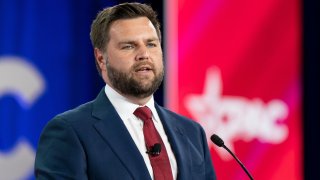Washington Must Push European Strategic Autonomy Forward
Washington must work toward providing Europe with the incentives to provide for its own security.
Last month, Senator JD Vance (R-OH) flew to the Munich Security Conference attended by powerful European officials, including Volodymyr Zelensky. During his speech, Senator Vance delivered some tough love to his European audience about the necessity for Europe to take a more significant role in securing itself from external threats. In particular, he touched on Europe’s weakness despite their supposed concern over a Russian confrontation with NATO.
“It’s very hard,” Vance stated. “The juxtaposition between the idea that Putin poses an existential threat to Europe, compared again against the fact that we’re trying to convince our allies to spend two percent of GDP. Those ideas are very much in tension. I do not think that Vladimir Putin is an existential threat to Europe and to the extent that he is, again, that suggests that Europe has to take a more aggressive role in its own security,” he said.
Vance’s rhetoric reflects his preference for realism and restraint. American power should be used decisively as needed but sparingly. Diplomacy should always be considered before resorting to military action. Moving forward, the United States will not seek conflicts irrelevant to American security. As such, European powers should bolster domestic defense to address challenges that directly affect their security.
Europe’s lack of strategic autonomy is not entirely its own fault. Many U.S. academics and policymakers have long been skeptical of Europe’s ability to defend itself, perpetuating a culture of dependence among European powers on Washington’s security umbrella. However, a coalition of Republican lawmakers, including Senator Vance, are adamant that Washington should push Europe toward strategic autonomy.
These policymakers are not alone in believing that Europe should do more to defend itself. A 2023 poll by Newsweek found broad American support for NATO and Ukraine but suggested that voters want to see their European allies pivot towards greater military self-reliance. The shift toward realism and restraint in U.S. foreign policy is a durable trend. The American public has long supported it, as they have recognized the missteps made through foreign adventurism.
Congressional resistance and skeptical public opinion show that the aspirations of the foreign policy elite, particularly in Ukraine, come at an intolerable cost. U.S. support for Ukraine is still in flux, and its future is not guaranteed. Thus, Washington and its European allies must come to a mutual understanding that the status quo is not sustainable.
The Russo-Ukrainian War has highlighted the stagnation of Europe’s defense industries. While a minority of countries meet NATO’s two percent of GDP spending target, including mainly Poland and the Baltic countries—who are both close in proximity to Russia—many of NATO’s wealthiest members are failing to meet the two percent standard. Despite Germany showing some promise to significantly increase its military spending at the start of the Ukraine conflict—as German Chancellor Olaf Scholz pledged to reverse the decades-long, self-described trend of a neglected military—Berlin did not meet the spending target in 2022 or 2023. Similarly, despite France’s aspirations to exercise its strategic autonomy, Paris has also fallen short.
Washington must work toward providing Europe with the incentives to alter its position on providing for its own security. As it stands, U.S. foreign policy is far too Euro-centric, with the foreign policy community often composed of “Cold warriors” or those who came of age during the “unipolar moment” after 1991. Washington does have an interest in Ukraine being able to defend itself and deter future attacks from Russia, as Ukraine provides depth to NATO’s eastern flank. However, with higher priorities that concern American prosperity, such as a potential Chinese invasion of Taiwan, Europe needs to work toward filling gaps left by Washington.
By accompanying a ceasefire or settlement in Ukraine, with Europe providing the bulk of military aid to Kyiv, the success of a formidable Ukrainian defense would significantly increase. Denying Moscow the ability to make further gains makes for a durable peace and will ideally end the cycle of violence.
A future jumpstart of European defense industries will not be rapid or easy. Justin Logan, the director of defense and foreign policy studies at the Cato Institute, has outlined realistic suggestions to change NATO’s status quo, such as Washington being more assertive in its demands for alliance members, policymakers publicly reevaluating U.S. overseas deployments, and maintaining ambiguity regarding where and under what circumstances it is willing to fight for its allies’ interests. This U.S.-led shift will take considerable time but should be approached with urgency to get the process started as quickly as possible.
The current state of the Russo-Ukrainian War should be a wake-up call for Washington and its NATO allies. A shift in posture could be a valuable exercise for Europe to grapple with current geopolitical challenges with the understanding that Washington cannot and will not subsidize their defense in perpetuity. This message must be made very clear, and it is up to Europe to decide how it responds.
Alex Little is an M.S. graduate of Georgia Tech specializing in Russian and Central Asian affairs and a Young Voices contributor.
Image: Shutterstock.com.

